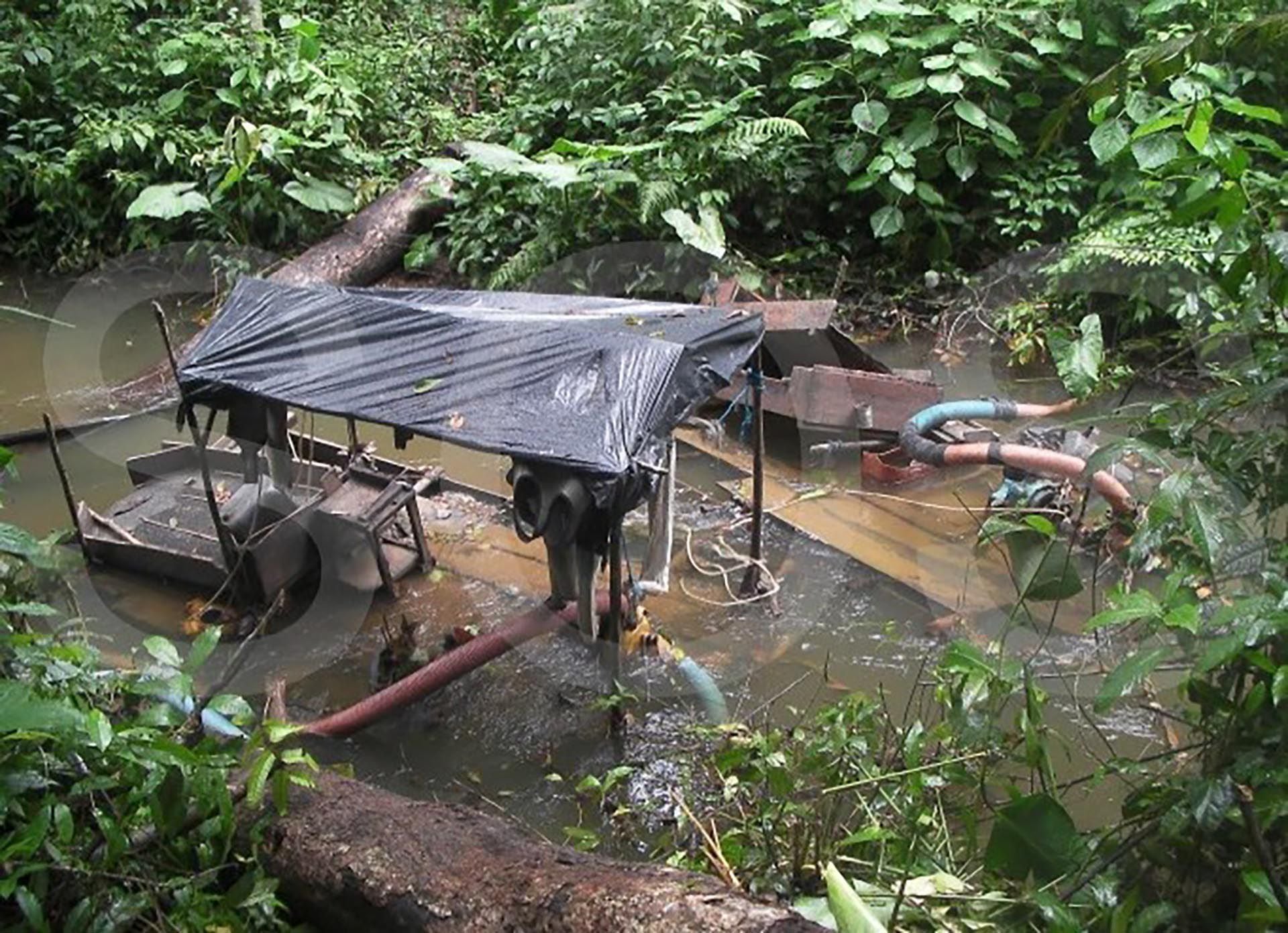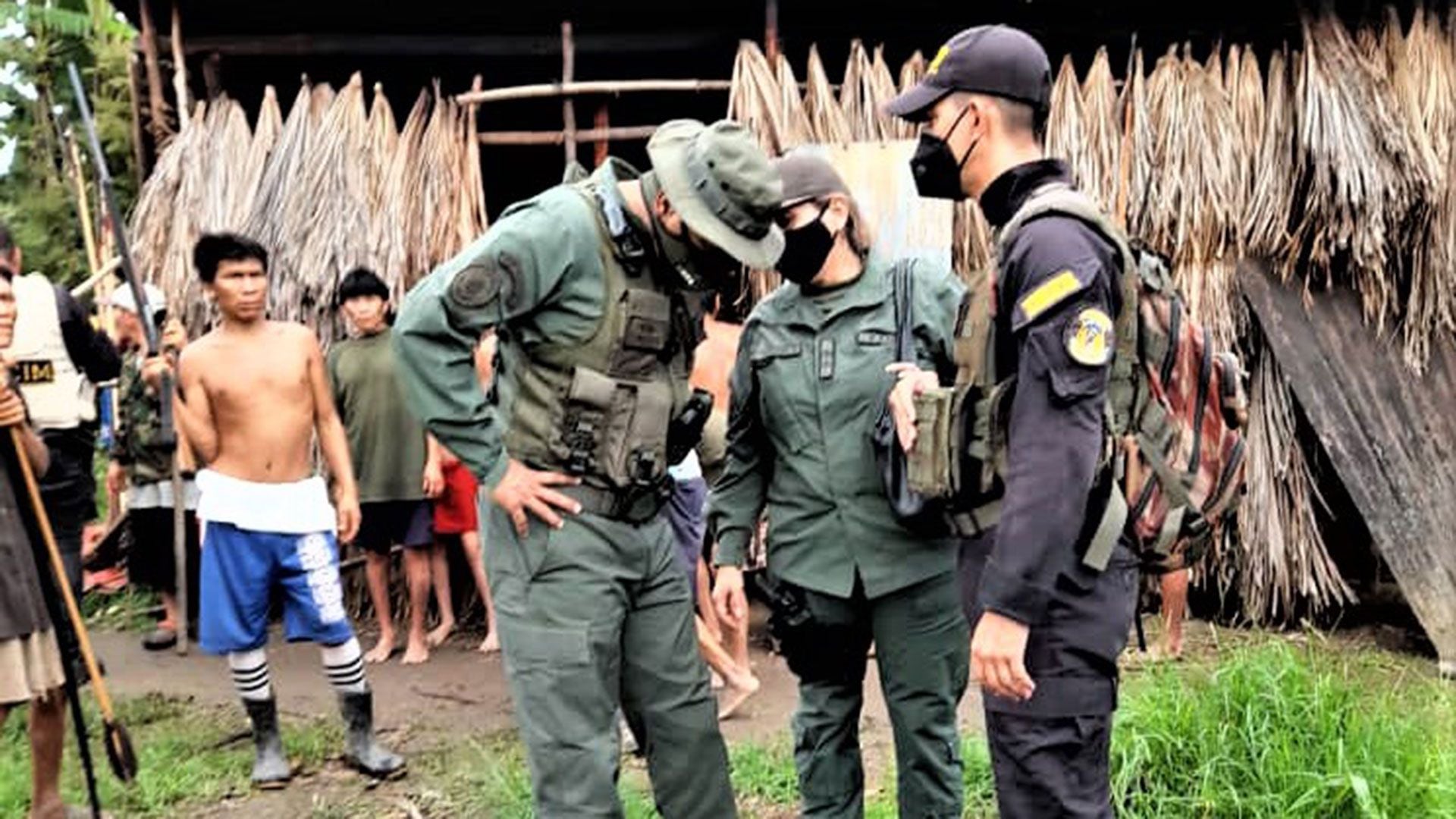
“No, no, it's not because of the internet device. What nonsense is that, if there is no electricity in the jungle. This Yanomami community is nomadic and lives on the shabono, what priority does the internet have for them if they all live in the same place in the middle of the jungle? The truth is that Aviation officials tried to convince Chief Sabino and other members to allow mining in completely untouched spaces. The community denied them permission and that caused the strong discussion with the military, who said they should pay a large amount in gold to the ZODI General and the Aviation Commander. The military attacked the Yanomami brothers with firearms, killing and injuring several,” an indigenous source who asked to keep his name reserved, said in conversation with Infobae.
Later, the indigenous people, faced with the assassination of the Yanomami, surrounded the military and a video shows an officer promising that the one who must answer is the Inspector General of Aviation. The indigenous people tell the officer that no one leaves the place, because what happens there, by the law that assists them, must be resolved there and they prevent the 17 soldiers from leaving the place.
It was approximately 4 in the afternoon. At the Border Military Base located in Parimabe, Alto Orinoco municipality in Amazonas state, nothing warned the dark cloud that hung over the Yanomami population. It is true that in the military post there are solar panels and an internet antenna, but since they did not have the router, the community got one with an NGO, they agreed to provide them to the military in exchange for everyone having access to the internet.
It was not the first time that there were problems with access to the internet. “In reality, the military was only pressuring the Yanomami to give them permission to extract gold from virgin territory and the way they managed was by preventing them from accessing the internet or using the airstrip, which makes it very difficult to access the site by land or river. The incident was nothing more than an excuse for the military to make the Yanomami brothers feel that they have power.”
It is appalling that Venezuelan soldiers murdered four Yanomami of the last remaining indigenous people in South America, on the border between Venezuela and Brazil. The responsibility lies with the military institution, because it happened at the Parimabe Military Aviation Base, with uniforms from a military unit of the state Aragua, which may indicate that they have not been prepared to understand the customs of such an important people as the Yanomami.
Gold, gold
The killing of indigenous people had not attracted attention with such noise, perhaps since the massacre of Xaximu occurred in 1993, called yes because it began on the outskirts of Haximu on the border between Brazil and Venezuela; the garempires killed four young Yanomami from that area. The indigenous response caused the death of two garempires, so the counterattack of the Brazilian gold exploiters was atrocious, killing 12 Yanomami, including a baby, dismembering the bodies to finally burn Haximu village.
A few months ago, Venezuelan soldiers held a Brazilian boat in Rio Negro that for a long time had been traveling from San Gabriel de Cachoeira, Brazil, and Rio Negro, Amazonas, Venezuela, with merchandise, because it is closer to Brazil than Puerto Ayacucho.
The military held the boat, appropriated the products and weapons that were on the boat. The protest of the communities in the area was not long in coming and they managed to get the boat back to its owners.
“What is happening is that the military has been demanding more and more money, gold, profits, access to the proceeds of fuel smuggling, and they are not adapting to the culture and modus vivendi of the communities that manage to access the products needed to survive in this difficult area. Instead of guaranteeing them protection and safety, access to food and goods, the military harasses and pressures the community.”

There is agreement in several sources, to which Infobae had access, that the main problem is gold. “They are mining gold without minding over indigenous communities. Alto Orinoco has been converted into a mining area, including in Cerro Delgado Chalbaud, in the area where the Orinoco river rises, in the Sierra de la Neblina National Park there are machines. The indigenous people fear not only the Brazilian garempires but the Venezuelan military.”
Every soldier sent to that area is not punished, as it was before due to the difficult conditions in the area, it is now recommended for access to gold mining, including the 17 of the Delgado Chalbaud Border Base.

Recently, the general of the ZODI had ordered the replacement of Army officials by those of the Aviation, which at first worked very well until the military asked Chief Sabino to allow them to enter machinery for mining operations. The Indian chief refused on the grounds that this is a virgin area. “What we want is to give a greater tribute to the Chief of the ZODI and to be left in Parimabe,” the uniformed men insisted, but the Yanomami did not give in.
Now, soldiers in the area are requesting that Chief Sabino be arrested for “attack on the sentry”, because a son of his snatched the gun from the first lieutenant of the military post and threw it into the yard, from where his father took it who shot two of the injured soldiers.

Where is it
When the Yanomami went to the Public Prosecutor's Office, they received pejorative treatment by Senior Assistant Prosecutor Adelis Ramírez. Several indigenous people who were in the capital came to the Public Prosecutor's Office, but refused to attend to them, until more indigenous people showed up with bows and arrows, so the Prosecutor came down to talk to them.
Amazonas is the second largest state in Venezuela, but the one with the least population density; it is located on the border. It could easily be mistaken for a paradise because of the riches it has in its bowels: precious stones, emeralds, coltan, but also the majestic rivers, the brave and mysterious jungle, the enigmatic particularity of its indigenous communities. More than 60% of its population is in Puerto Ayacucho, the state capital. Its beauty and riches are also the reason for its tragedy, because of the desires of the guerrilla groups in Colombia and the garempires of Brazil.
To get to Parimabe, where the events that led to the death of the four indigenous people took place, the only appropriate thing is to go by air, either by plane or helicopter, stopping at the La Esmeralda post, capital of the municipality, which takes about 50 minutes by flight and from there to Parimabe there is another 45 minutes flight. It is a dense area, lots of vegetation and jungle around.
There are no more than 100 people in that area, and all of them are Yanomami Indians, who live on Shabono. The only exogenous thing is the military post, which used to be occupied by the Army and now Military Aviation; the other closest military post is the Cerro Delgado Chalbaud Security base, practically the last military post in the area.

The unusual statement
The murdered Yanomami were four whom we identified only by the acronym of their names, out of respect for the Yanomami culture, because the name of the deceased should not be pronounced: EGS (30 years old), JIB (21), TCG (22) and MG (45). Injured Indians: 16-year-old Borges Sifontes teenager, injured in the arm and is in the José Gregorio Hernández Hospital in Puerto Ayacucho; Chief Sabino Silva, injured in the head and right hand, and Gary García, injured in the right hand.
The military were also injured: Christopher Jesús Bolivar Pino, Eduar José Evans and soldier Jéferson Jesús Sebastián Garrido. The soldiers ended up wounded by the indigenous people with the same weapons they carried.
The mayor of the Átures municipality and former Minister of Indigenous Peoples, Yamilet Mirabal, who is an indigenous native of the yeral people, was commissioned to conciliate with the Yanomami, said that “on the instructions of the High Command” she was present there with a multidisciplinary team “to attend and clarify a problem presented for cultural differences”.
Always insisting on placing the indigenous people in the same situation with the military, although the first ones had bows and arrows while Aviation officials used firearms, he added that “like everything in a party, in a fight, there was a confrontation there was an argument at that time and everything falls under pressure, to defend oneself each of the parties. Apply justice where it must be applied on both sides”.
He agreed that “the Indigenous Peoples Act applies, but we also have to hear the versions of both parties; the Yanomami people were heard and the other side was heard. We know that there is sadness, we have pain, on both sides, we have some officials who are also in a very delicate health situation”, was the statement of the former minister.

The confusion
The excuse is that there was a confrontation, over an internet router, between the Yanomami and Aviation officials, on Sunday, March 22, 2022, which led to the death of the indigenous people at the hands of the military. The confusion arises from what was initially said by an official at a local radio station, which was taken over by other media and various spokespersons.
The Delegated Ombudsman, Gumercindo Castro, said on the program “On the Table”, on Raudal Estéreo 92.9 FM, that they had launched an investigation into the complaint they received by telephone for “alleged confrontation between members of the Yanomami community and members of the Armed Forces; according to the investigations we learned that the confrontation arose due to the breach of the agreement of the Military Base with the indigenous people on the use of the internet system. The antennas are installed in the Base and the router is owned by the community; since the agreements were not being complied with, the indigenous people wanted to remove the router, which caused the confrontation between the two groups.”
Castro emphasized that “the first authority to receive the information was the Commander of the Integral Defense Operational Zone (ZODI), Major General José Ramón Maita González, who moved to Parimabe the following day, accompanied by the Military Prosecutor's Office. On Tuesday the 22nd, the joint commission consisting of CICPC (Corps for Scientific, Criminal and Criminal Investigations), CENAMECF (Forensic Medicine), the Public Prosecutor's Office, the General of the Air Base and all the entities involved in this area will be transferred to the scene. Indigenous Special represented by Dr. Bertha Macuribana.
KEEP READING:
Últimas Noticias
Debanhi Escobar: they secured the motel where she was found lifeless in a cistern

The oldest person in the world died at the age of 119

Macabre find in CDMX: they left a body bagged and tied in a taxi
The eagles of America will face Manchester City in a duel of legends. Here are the details

Why is it good to bring dogs out to know the world when they are puppies




